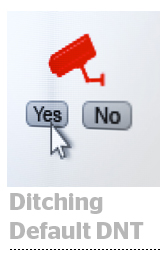 Microsoft has reversed its approach to Do Not Track (DNT) and will no longer make it the default setting on the Internet Explorer browser and IE’s eventual replacement, Spartan.
Microsoft has reversed its approach to Do Not Track (DNT) and will no longer make it the default setting on the Internet Explorer browser and IE’s eventual replacement, Spartan.
In a Good Friday blog post, Microsoft Chief Privacy Officer Brendon Lynch said the decision was made in order to comply with the World Wide Web Consortium’s (W3C) redefined parameters for online data collection.
The W3C stated that DNT is meant to attain users’ tracking preferences: “The basic principle is that a tracking preference expression is only transmitted when it reflects a deliberate choice by the user. In the absence of user choice, there is no tracking preference expressed.”
DNT will no longer be the default “when customers set up a new PC for the first time, as well as when they upgrade from a previous version of Windows or Internet Explorer,” Lynch wrote.
If you haven’t even considered DNT for a while, you’re likely not alone. The truth is that DNT doesn’t do anything to promote consumer privacy and “has no meaning,” according to Mike Zaneis, EVP and general counsel at the Interactive Advertising Bureau (IAB).
“Whether a signal is sent or not sent, that’s just noise. It doesn’t actually block off any data,” he said, adding he didn’t see Microsoft’s reversal as a “sea change in their position” – only that it will make the company’s browsers compliant with W3C’s DNT standards.
Microsoft first unveiled plans to make DNT its default browser setting in 2012. The decision caused uproar from the digital advertising community. Microsoft painted its approach as “privacy by default.”
However Evidon, the Association of National Advertisers and the IAB all argued that DNT should always be opt-in and claimed Microsoft had jumped the gun before the industry had reached a consensus on what types of data tracking threatened online privacy.
“It sent a political message that Microsoft cared about privacy,” said Zaneis. “The unfortunate result was that it actually undermined a lot of the progress that maybe could have been made on the Do Not Track discussion, because it took that signal away from the consumer and made it the decision of a company.”
Many industry insiders were particularly displeased because Microsoft had initially praised an agreement by the legislation. The Digital Advertising Alliance agreed that DNT should be opt-in.
Its stance back in 2012 seemed to be in the interests of gaining consumer favor for its own browser.
Following its reversal Friday, Microsoft stuck to its consumer-first narrative.
“We said in 2012 that browser vendors should clearly communicate to consumers whether the DNT signal is turned off or on, and make it easy for them to change the setting,” Lynch wrote. “We did that for IE 10 and IE 11. And we’re continuing to do so with future versions of our browsers.”
Microsoft’s decision arrives when DNT has receded from the public discussion and is much less relevant than it was a few years ago, especially given the rise of mobile and new ways to follow consumers across channels.
“Do Not Track had some potential three or four years ago. It was beat into the ground by overly complex proposals and privacy advocates making it more complex,” Zaneis said. “At the end of the day it was an idea that had an interesting spark but it never ignited and that spark has gone out.”











